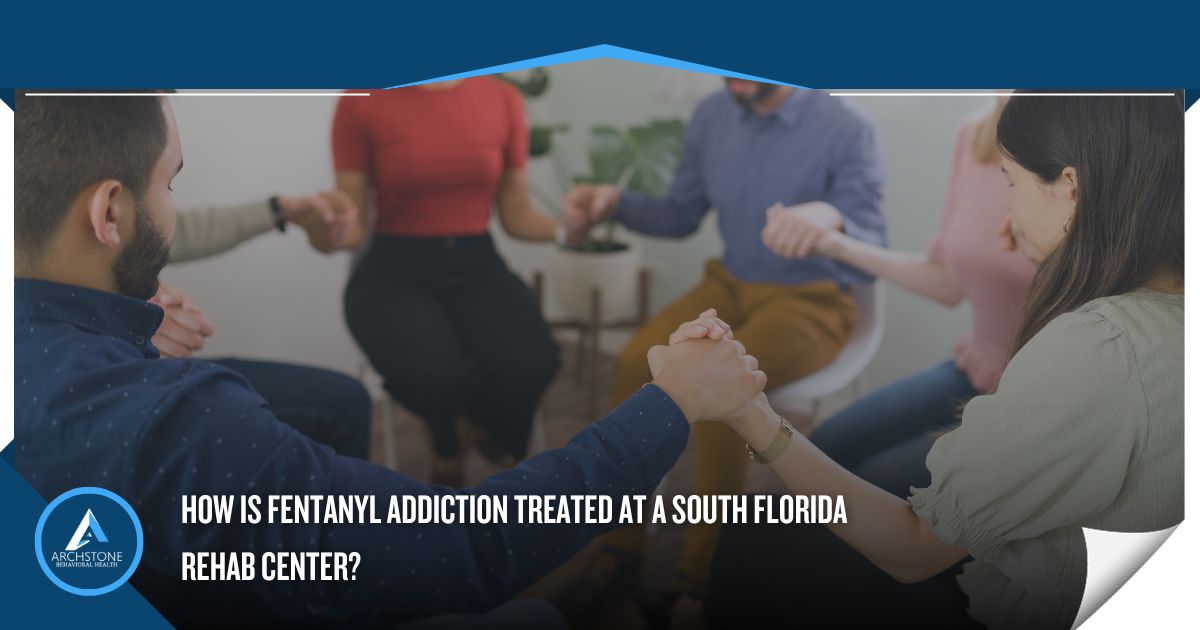How is Fentanyl Addiction Treated at a South Florida Rehab Center?
Get Help Now

Each year, thousands of people lose their lives to a deadly fentanyl overdose, and many more struggle with misuse and addiction. Research showed that between 2020 and 2021, over 75,000 people in the United States suffered a lethal overdose involving synthetic opioids. Opioid abuse and addiction is a quickly growing problem in this country, and people who live with these conditions require immediate, comprehensive treatment.
Fentanyl addiction is a complex, life-threatening condition, but people living with it can recover if they get the treatment they need. Knowing what to expect from a fentanyl addiction rehab center may help you feel more confident when seeking treatment and keep you motivated to continue treatment when recovery feels challenging.
Reach out to the Archstone Behavioral Health specialists now to learn about our comprehensive fentanyl addiction treatment programs or for support during any stage of your recovery.
Understanding Fentanyl Addiction
Fentanyl is a synthetic opioid derived from the seed pod of the opium poppy plant. In many ways, it is similar to morphine–but it is 50 to 100 times more potent. Doctors can prescribe fentanyl to help relieve patients’ pain after surgery and other procedures or for those who have developed a tolerance to other opioid medications.
Because of the high risk for abuse and addiction, doctors typically only prescribe fentanyl for short periods. Taking fentanyl for longer than prescribed or in higher doses can lead to tolerance, misuse, or physical dependence.
Fentanyl works in the body by binding to opioid receptors in the brain. Many of these receptors are in areas of the brain related to pain management, pleasure, and reward. Fentanyl also alters endorphins, which are neurotransmitters that provide natural pain relief and a sense of calm and well-being. The body naturally produces endorphins when people exercise, laugh, have sex, or engage in other pleasurable activities.
Because fentanyl causes pleasurable feelings in addition to relieving moderate to severe pain, many people want to use it differently than prescribed. People may take it for longer periods or take higher or more frequent doses. Over time, they may develop tolerance–meaning they need to take more to get the desired effects of the drug. After a period of heavy use, people may develop physical dependence or addiction to fentanyl.
The Effects and Risks of Fentanyl
One of the most significant risks of fentanyl abuse is overdose. Fentanyl is lethal in tiny doses, and people may unintentionally overdose if they take larger doses than prescribed. Some other unwanted effects of fentanyl abuse include:
- Drowsiness
- Excessive sedation
- Nausea
- Constipation
- Confusion
- Loss of consciousness
- Slowed breathing
A fentanyl overdose can cause depressed breathing that can cause a lack of oxygen to the brain. It is a medical emergency, and you must call 911 if you believe you or someone near you is experiencing an overdose. Administer naloxone if available and wait with the person until EMS arrives.
Signs of Fentanyl Addiction
Fentanyl addiction can quickly spiral into a life-threatening situation, and it’s essential to seek treatment as soon as you can to avoid disastrous consequences. Recognizing the signs of addiction can help you seek fentanyl addiction treatment as quickly as possible.
Here are some of the signs of fentanyl addiction:
- Taking fentanyl without a prescription
- Using fentanyl differently than prescribed
- Spending a lot of time, energy, and money to get, use, and recover from using fentanyl
- Neglecting your responsibilities, relationships, or hobbies
- Isolating away from others
- Continuing to use fentanyl despite the harm it causes
- Experiencing withdrawal symptoms if you stop taking fentanyl
- Having cravings for fentanyl or other opioids
It’s possible to develop physical dependence on fentanyl even if you take it as prescribed. Be aware of the signs of fentanyl addiction and seek treatment as soon as you recognize a problem.
How is Fentanyl Addiction Treated in a South Florida Rehab Center?
For many, the first stage of fentanyl addiction treatment is a medically-supported detox program. People with fentanyl addiction often need significant medical and emotional support during detoxification to manage withdrawal and achieve sobriety.
Some common fentanyl withdrawal symptoms include:
- Nausea
- Vomiting
- Muscle aches
- Chills, goosebumps, and cold flashes
- Uncontrollable leg twitches
- Diarrhea
- Insomnia
- Intense cravings
During detox, you will receive supervision, medications, and emotional support that will allow you to have a safe, complete detoxification process.
After completing detox, you must continue treatment in a comprehensive rehab program that will help to address the physical, emotional, and behavioral aspects of your substance use. Your treatment team will assess your needs and develop a personalized plan that may include:
- Individual counseling
- Cognitive behavioral therapy
- Family therapy
- Group support sessions
- Mental health treatment
- Relapse prevention education
- Coping skills practice
- Holistic treatments like yoga, massage, nutrition support, and mindfulness
- Aftercare planning
The length of your rehab program will depend on the severity of your addiction, your mental and physical healthcare needs, and other factors. With comprehensive treatment and ongoing support, you can develop the tools to live the healthy, sober lifestyle you choose–instead of the one your addiction chooses for you.
Find a South Florida Fentanyl Addiction Treatment Center
If you or someone you love needs the support of a fentanyl addiction rehab center in South Florida, the care you need is just a phone call away. Reach out to the team at Archstone Behavioral Health now to learn about our holistic addiction rehab programs or to be connected to support during any part of your recovery journey.
